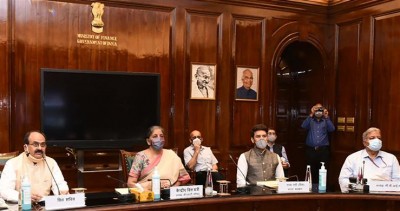New Delhi, Aug 27 : Union Finance Minister Nirmala Sitharaman said that the GST Council at its meeting on Thursday did not discuss any tax rate increase but hinted that these issues could be discussed only after states come back with their views on GST compensation options provided by the Centre.
“There was no discussion even for a minute on GST rate increase in today’s council meeting. Going on specific measures would be like going too much on a speculative ground. I cannot predict what the Council may do in terms of cess itself,” Sitharaman said briefing mediapersons about GST Council’s meeting when asked what would be the roadmap of cess and rates to compensate the states in the changed environment.
While the GST Council did not discuss rates, those present in the meeting said that this would certainly come in subsequent meetings as a clear path should be drawn on how the Centre would pay compensation to the states.
Sources said that in forthcoming meetings later this year or early next year, the Council may look at the entire structure of compensation cess and consider raising the rates to mobilise more money into the compensation fund. Also, the Council may decide to bring more goods and services, beyond luxury and sin goods, under the cess mechanism.
“Various options are available but given the current conditions these would need to be applied with caution as Covid-19 has affected economic activity throughout and higher levies at this juncture could further impact demand conditions,” said an industry expert not willing to be named.
Pratik Jain, Partner and Leader, Indirect Tax, PwC India said: “It’s clear now that the period of compensation cess would now be increased beyond 5 years as contemplated at the time of GST implementation. However, it’s good to see that the GST Council did not discuss the possibility of immediate rate increase in cess which is not desirable in the current economic environment.”
M.S. Mani, Partner, Deloitte India, said: “Any decision to extend the cess beyond 5 years in order to fund the present compensation deficit could become a precedent, hence the period of extension of the cess should be minimal and predefined so that the cess does not become a permanent tax.”
Disclaimer: This story is auto-generated from IANS service.

